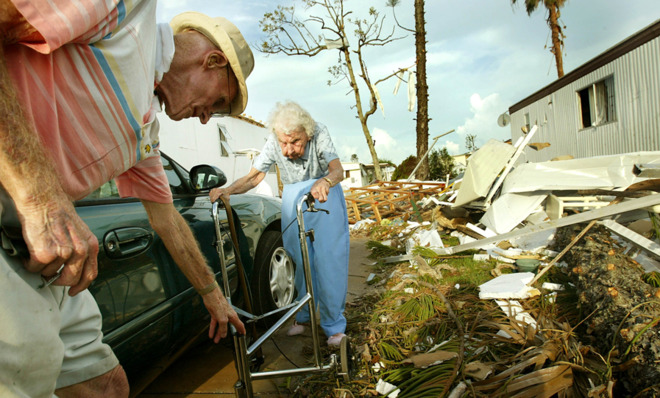How the digital divide hurts the elderly in times of crisis
We have grown accustomed to heavily relying on technology during disasters like Hurricane Sandy. That leaves senior citizens at a huge disadvantage.

A free daily email with the biggest news stories of the day – and the best features from TheWeek.com
You are now subscribed
Your newsletter sign-up was successful
I can't remember a time when I didn't use the internet. I wrote my first research paper in my family's basement on a boxy, tan Windows desktop. I opened my college acceptance letter from my email account. I have hundreds of photos on Facebook and Instagram.
So many of my assignments, emails, and favorite moments are stored online. If a disaster happened tomorrow, it's comforting to know these items could be recovered.
But approximately 60 million Americans do not have access to internet. Recent data from the Pew Research Institute shows almost half these individuals are over 65 years old.
The Week
Escape your echo chamber. Get the facts behind the news, plus analysis from multiple perspectives.

Sign up for The Week's Free Newsletters
From our morning news briefing to a weekly Good News Newsletter, get the best of The Week delivered directly to your inbox.
From our morning news briefing to a weekly Good News Newsletter, get the best of The Week delivered directly to your inbox.
Being offline can be extremely isolating, especially for the elderly. In an interview with The New York Times, Tom Kamber, who runs a program teaching senior citizens how to use technology, said, "Isolation is an unrecognized crisis among seniors. A lot of older people feel, in the digital age, that they are not relevant or included."
Many elderly people are on the wrong side of the digital divide, a term referring to the social and economic split between those who have the knowledge, skills, and ability to access technology and those who don't. In our digital world, the gap between the haves and the have-nots is persistent and becoming increasingly problematic.
As the world prepares for more extreme weather, crop shortages, epidemics, and global conflicts, digital communication will be more important than ever. Recent natural disasters have shown that being disconnected has devastating consequences for the elderly and their families.
During Hurricane Katrina, more than 70 percent of those who died were over 60 years old. Many who survived did not receive proper medical care because paper health records were destroyed during the storm.
A free daily email with the biggest news stories of the day – and the best features from TheWeek.com
After the 2007 Witch Creek wildfire in San Diego County, elderly homeowners struggled to get compensation for lost belongings. In an interview with Pomerado News, Valerie Brown, a coordinator for an organization helping families recover after the fire, said, "Documenting is the hardest part. People have a lot of stuff...and proving it is really difficult. They have to recreate [a list] from photos, memory, and credit card statements, and [place a] value on all of that."
In 2012, when Hurricane Sandy hit New York, thousands of people turned to social media for the latest safety updates, but many elderly residents were unable to take advantage of such networks to seek help.
Some of these tragedies could have been avoided if senior citizens had digital tools to make copies of important documents, find safety, and access resources in the aftermath of a disaster. In The Journal of Aging in Emerging Economies, Dr. Isiah Marshall Jr. and Dr. Shannon Mathews write, "Many disaster assistance programs are computer-based, and the elderly may not register for benefits because they may not be aware of resources or do not have the skills to apply for assistance."
Helping seniors connect online will allow thousands of people to engage with their communities to plan for extreme conditions, rather than being passive bystanders. They will have more opportunities to communicate with family, access public services, and receive the latest safety information during a crisis.
Introducing seniors to technology will also emotionally prepare them for the aftermath of disasters. Helping someone scan an old letter or upload photos to Facebook might seem inconsequential, but losing these mementos can often be as devastating as losing a home or community.
When Hurricane Sandy destroyed Micháela Murray-Nolan's New York home, her family lost everything. Murray-Nolan learned about a Facebook page reuniting New York residents with objects found after the storm. She was able to recover one family photo, a picture of her father and brother. In an interview with the New York Daily News, Murray-Nolan said, "I was so excited to even have back even one photo for my dad, who doesn't remember our childhood. It's just so important."
Several programs are already teaching senior citizens digital skills. Last month, Google Fiber and the Sprint Foundation funded the Kansas City Digital Inclusion Fund, a program that pairs low-income high school students with seniors who want to gain technological skills. OATS — Older Adults Technology Services — is an organization that teaches courses to senior citizens in New York City libraries, schools, and community centers.
Although these programs are valuable, they won't reach everyone. Plenty of elderly individuals can't physically leave their homes to take classes or afford to buy digital devices. But that doesn't mean they should be left behind. While no single person or policy can offer an easy solution, strengthening communication and building more inclusive networks is a good place to start.
-
 The Week Unwrapped: Have televised confessions quelled protests in Iran?
The Week Unwrapped: Have televised confessions quelled protests in Iran?Podcast Plus, why has Elon Musk turned from Mars to the Moon? And will the BBC prove to be a puzzles champ?
-
 The week’s best photos
The week’s best photosIn Pictures An Andean god, a rogue squirrel, and more
-
 9 products to jazz up your letters and cards
9 products to jazz up your letters and cardsThe Week Recommends Get the write stuff